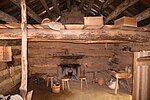Conner Prairie

Conner Prairie is a living history museum in Fishers, Indiana that preserves the historic Conner farm and recreates part of life in Indiana in the 19th century on the White River.
Layout and concept

The museum grounds are divided into several sections, where different eras in history are recreated to create a kind of living timeline. Staff in period costumes demonstrate the way early inhabitants in the area lived. They explain their livestyles in character while performing chores such as cooking, chopping wood, making pottery, and tending to animals. In some cases, patrons are invited to join in the activities.
The museum's main building, called the Museum Center, contains the entrance lobby, ticket sales counter, restaurant, banquet hall, and gift shop. The gift shop sells pottery made by the museum's costumed staff as well as more conventional souvenirs.
Attractions

Conner Prairie features several permanent attractions and numerous semi-regular events, including "Mystery on the Prairie" murder mystery evenings, the Headless Horseman ride in the autumn, candlelight tours, and country fair. It also hosts Civil War re-enactments, and Christmas holiday events and dinners.

Conner house
The genuine Conner brick house and barn are preserved as a museum. Visitors can hear about how early Hoosiers cooked, spun and dyed thread and yarn, and cared for their animals and crops.
PastPort
Visitors can get hands-on experience dipping candles, carding wool, milking a cow, and participating in other pioneer activities.
1886 Liberty Corner
Liberty Corner recreates a rural community in 1886, with a schoolhouse, Quaker meeting house, authentic covered bridge, and farm (Victorian home and three-bay bank barn). Visitors might even catch a vintage base ball game.

1836 Prairietown
Prairietown recreates a pioneer community in 1836, with a blacksmith shop, pottery shop, inn, doctor's office, schoolhouse, and several residences. Early visitors might help with morning chores.

1816 Lenape Camp
Lenape Camp recreates bark and reed wigwams and a fur trade camp with a log cabin. Visitors can learn how the Lenape (Delaware Indians) lived in Indiana in 1816 and hunted and trapped animals to trade with white fur traders.
